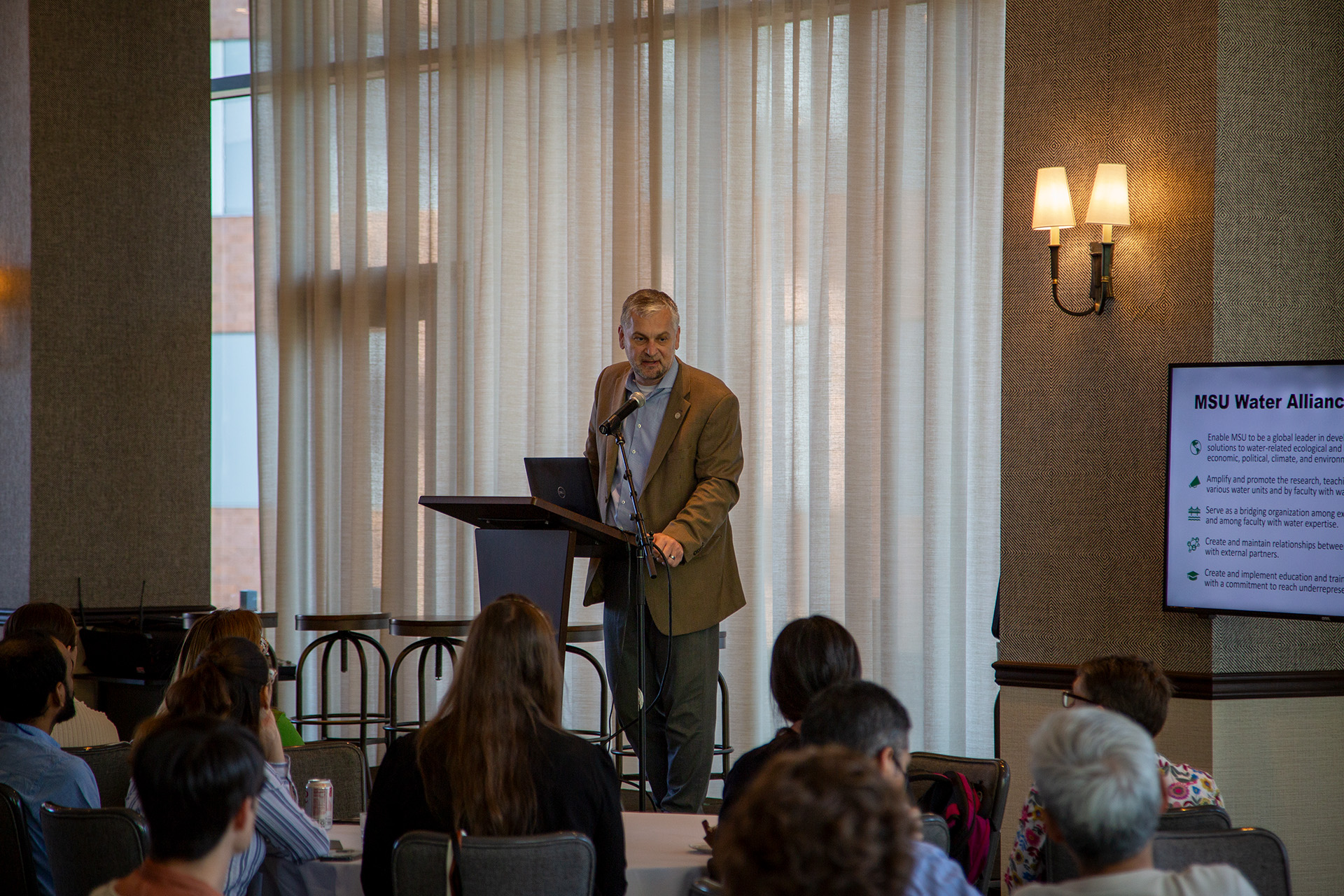Skaggs, D-East Grand Rapids, sat down with the MSU Water Alliance recently to talk about his bill to establish a statewide sanitary code in Michigan. House Bills 4479 and 4480 would require all residential septic systems to be inspected every five years.
The bills were introduced last year and referred to the House Committee on Natural Resources, Environment, Tourism and Outdoor Recreation. So far, the bills have not seen any movement.
Skaggs said the House has until the end of the year to take action. Otherwise, the bills will die with the end of the two-year legislative session. A new set of bills would have to be re-introduced in 2025 if the state wants another shot at establishing a statewide sanitary code.
Thousands of failing septic systems
When homes are built beyond the reach of municipal sewer lines, they’re equipped with an onsite wastewater treatment system, including a septic tank and drain field. These systems have a lifespan and must be pumped and replaced before failure. However, Michigan has no statewide set of rules requiring inspections—and it’s the only state without such a code.
Meanwhile, Michigan also has the highest number per capita of home septic systems, with about 30 percent of all homes having onsite wastewater treatment. Of the 1.3 to 1.4 million homes with septic systems, the Department of Environment, Great Lakes, and Energy (EGLE) estimates that 330,000 are failing, sometimes without the homeowner’s knowledge. That means millions of gallons of raw sewage are released into Michigan’s groundwater every day, according to EGLE.
“Although dilution is the solution to pollution, we’re not diluting if we have too many septic systems, especially too many failing septic systems,” Skaggs said.
Septic system failure means untreated sewage finds its way into the groundwater. In 2015, an MSU study tied septic systems to the presence of E. coli in watershed.
The study was published by a team of MSU scientists, including Water Alliance Director Joan Rose and Anthony Kendall, a Research Assistant Professor in Earth and Environmental Sciences.
After sampling 64 river systems for E. coli and the human fecal bacteria B-theta, the study found that watersheds with more septic systems were more likely to be contaminated.
However, Skaggs said without a statewide code requiring inspections, failing septic systems might go undetected. As homes continue to age, he said the problem will only get worse.
About two thirds of all homes in Michigan were built before 1979, according to U.S. census data. That means that any home that age that hasn’t replaced its septic system is well outside of the standard 30-year lifetime of onsite wastewater treatment.
Part of the problem is the increasing pressure on septic systems due to the rise of short-term rentals, Skaggs said. Homes surrounding inland lakes are often furnished with extra beds and rented out to large groups instead of the four-person family its septic system was designed for.
Another challenge is the high cost of replacing a septic system at the end of its life. Installing a new one can cost as much as $10,000, Skaggs said. Some families just can’t afford that expense.
But it’s even more expensive to extend municipal sewage pipes to homes currently on septic systems. While a few projects are underway around the state, the cost is in the millions. And the only way to pay for them is by special assessment, meaning homeowners will foot the bill.
“You just can’t go in and assess someone $200,000,” Skaggs said.
Currently, it’s up to local units of government to establish rules for inspecting septic systems. The problem is, many local governments, especially small townships, don’t have the money to pay for such a program. Only 11 of Michigan’s 83 counties require septic inspections, according to a For Love of Water policy brief.
Research key to informing lawmakers
In theory, passing a sanitary code bill should be simple. Skaggs visits elementary schools and tells children “I’ve got this bill about poop.” Everyone agrees that we need clean water. However, getting the Legislature to agree on how to solve the problem hasn’t been easy. Similar legislation died in 2022 and 2018, largely due to disagreement over when inspections should be required.
Skaggs said Rose’s 2015 study has been a key part of his work on HB 4479 and 4480.
“The first issue in politics is proving that there’s a problem,” Skaggs said. “I think her study on the extent of E. coli in our waterways is foundational to convincing the stakeholders and legislators that this is a real problem that should be addressed.”
He said it’s crucial that lawmakers have more interaction with experts from the Water Alliance and MSU Extension. Lawmakers are good at seeing problems in their communities, but they rely on data to help them drill into the evidence and find the best solution, he said.
Because the septic issue is so complicated, an interdisciplinary approach to the problem is key. When faculty collaborate with lawmakers, they help turn science into action.
Skaggs encouraged MSU experts to reach out to state legislators and provide evidence-based data. Your research and expertise can help our state pass this crucial legislation. He suggested contacting lawmakers urging them to vote for the legislation, and passing on helpful data that could be used in discussions on the bill.
“When we work together to come up with solutions, we’re going to be in a much better place,” Skaggs said.
Story by Bethany Mauger

